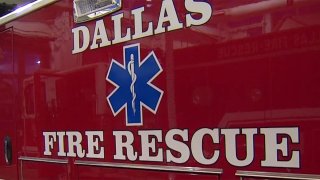
A Dallas Fire-Rescue firefighter has been infected with COVID-19, several others are symptomatic and more than two dozen other DFR employees are in quarantine after coming into contact with those employees, the Dallas Firefighters Association says.
Jim McDade, president of the DFA, confirmed DFR's earlier statement about a "member" testing positive for COVID-19, but added that another four or five firefighters were also showing signs of infection and awaiting test results. He said another 27 firefighters had to be quarantined after coming into contact with those people.
McDade said they were not sure when, where or how the firefighters were infected.
DFR spokesman Jason Evans first announced the positive test Monday morning saying a, "member reported feeling symptoms on Friday, March 20, while on-duty, and the test results were confirmed positive yesterday."
Evans said nine additional members working at the station were quarantined and the station was taken out of service while crews performed a "deep sanitation" of the station.
The fire station was put back into service Monday morning, Evans said.
Evans declined to offer any further details, including any details about the member's position or condition, including the station impacted. Evans also declined to say if any of the quarantined members were showing any symptoms of the infection.
When asked again about the additional members mentioned by the DFA, Evans had no further statement.
Last week, the Dallas Police Department confirmed two patrol officers, one in the Central Division and another in the Northeast Division, had contracted the virus. Both of the officers are in isolation and several of their coworkers have been put into quarantine.
*Map locations are approximate, central locations for the city and are not meant to indicate where actual infected people live.
How to Avoid COVID-19 Infection:
The best way to prevent infection is to take precautions to avoid exposure to this virus, which are similar to the precautions you take to avoid the flu. CDC always recommends these everyday actions to help prevent the spread of respiratory viruses, including:
- Wash your hands often with soap and water for at least 20 seconds. If soap and water are not available, use an alcohol-based hand sanitizer.
- Avoid touching your eyes, nose, and mouth with unwashed hands.
- Avoid close contact with people who are sick.
- Stay home when you are sick.
- Cover your cough or sneeze with a tissue, then throw the tissue in the trash.
- Clean and disinfect frequently touched objects and surfaces.
*Information shared from the Office of Texas Gov. Greg Abbott
Telemundo 39's Zully Salgado contributed to this report.

